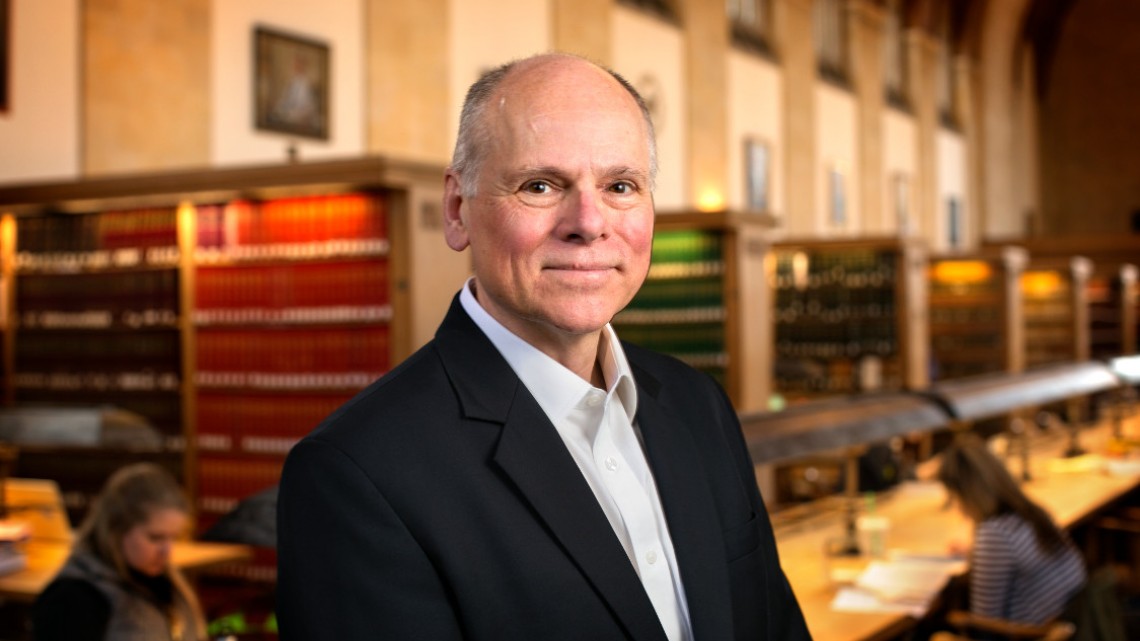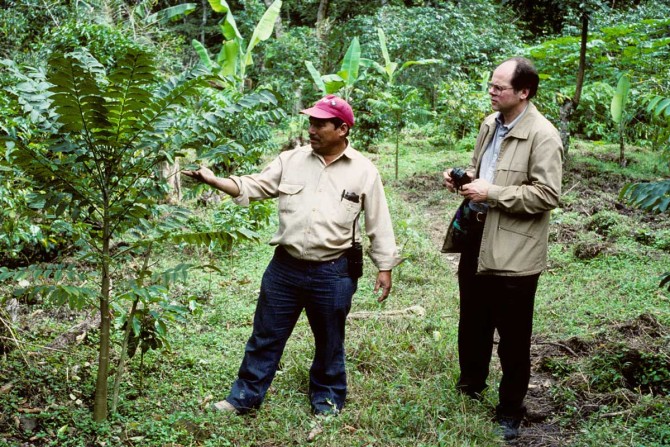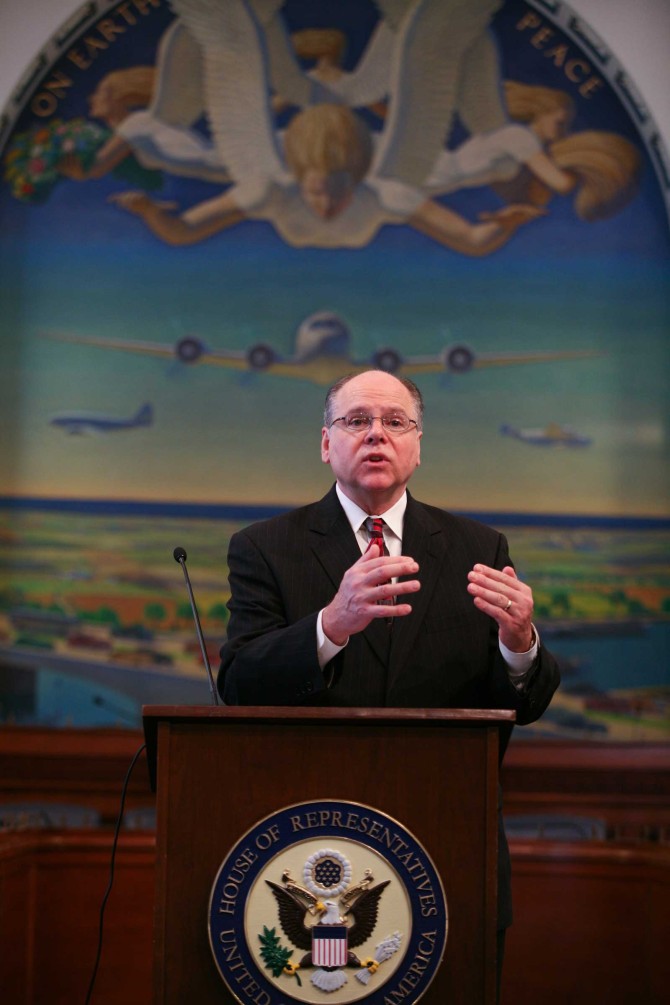
Max Pfeffer.
News directly from Cornell's colleges and centers
Innovative scholar and leader Max Pfeffer retires
By Matt Hayes
Max Pfeffer, a distinguished researcher of rural and urban communities and a leader who helped reshape the College of Agriculture and Life Sciences (CALS) for the 21st century, has announced his retirement. He is now emeritus professor of global development, effective July 1.
Pfeffer joined Cornell in 1993 at a time when globalization and environmental degradation were emerging as key issues on the global stage. As an assistant professor of rural sociology, he quickly developed an active research program funded by major competitive grants from the National Science Foundation, National Institutes of Health, the USDA Fund for Rural America, the USDA National Research Initiative and the Environmental Protection Agency (EPA). His research in key policy areas — including land use and environmental planning, rural and agricultural labor markets, and rural-to-urban and international migration — helped Cornell develop a reputation with policy makers for delivering innovative solutions to major social challenges.
In the 1990s Pfeffer played a leading role on a National Research Council Committee that produced an internationally recognized assessment of water supply protection. That assessment served as the decisive input in the EPA’s Filtration Avoidance Determination for New York City.
In collaboration with Pilar Parra, Pfeffer conducted one of the first systematic assessments of unprecedented immigration to rural areas of New York. This work not only identified immigration trends but also assessed the impacts on rural communities throughout New York state. Their findings informed state and national policy discussions about the economic, political and social consequences of skyrocketing immigrant settlement in the 1990s and 2000s.
Sergio Chávez M.S. ’02, Ph.D. ’07 was a new graduate student at Cornell when Pfeffer started conducting his immigration research in New York. Chávez said the complexity of the data collection inspired him to focus on sampling hard-to-find populations in his own research.
But it was Pfeffer’s work as a teacher that most captivated Chávez. On campus Pfeffer was a popular instructor known for his engaging teaching, with his course Environment and Society a favorite of undergraduates. Pfeffer’s graduate course in classical sociological theory attracted many graduate students from a variety of social science fields, including Chávez.
“Max always emphasized the learning process and the joy of understanding complex concepts and theories. His passion for teaching rubbed off on me,” said Chávez, now an associate professor who teaches sociological theory to undergraduates at Rice University.
Chávez, a first-generation student who grew up in California, said he initially lacked confidence that he belonged when he arrived at Cornell. But one moment that he recalled helping him feel accepted was when Pfeffer and his wife, Pilar Parra, invited the young graduate student to their home for dinner.
“Max had that way about him,” Chávez said. “His warmth helped me feel integrated and part of the university. He helped instill the confidence that I belonged here and could flourish.”
Chávez is one of numerous graduate students advised by Pfeffer who went on to successful careers in academia and with multinational development organizations.
By the early 2000s Pfeffer assumed leadership roles across the college, including in the Department of Development Sociology, the Cornell Center for the Environment and the Cornell University Agricultural Experiment Station. In 2010 he was named senior associate dean at CALS by Dean Kathryn J. Boor ‘80, and he later became the first executive dean of the college.
“Max has an extraordinary combination of characteristics that make him highly successful as a leader. In addition to his great sense of humor, he is brilliant, persistent, patient — and relentless,” said Boor, now dean of the Graduate School and vice provost for graduate education.
“When the CALS strategic planning process revealed a number of ambitious opportunities for the college, it was clear that Max was the person best suited to transforming those dreams into reality.”
Appointed executive dean by Boor in May 2017, Pfeffer focused on special initiatives and the implementation of strategic priorities, including various international initiatives. Pfeffer regularly traveled tens of thousands of miles each year on behalf of the college. He negotiated a number of agreements including an innovative undergraduate dual degree program in Food Science with China Agricultural University. He also oversaw the formation of the Department of Global Development.
Launched in 2020, the Department of Global Development brings a multidisciplinary focus to key global issues, including those in New York state. The genesis for the department emerged from a 2016 CALS Faculty Task Force that identified core strengths spread across the college. Pfeffer led efforts to consolidate expertise across multiple disciplines — among them agriculture, sociology, rural development, economics, nutritional sciences, community development and natural resources — into a unified department.
“We are empowering faculty to work together on a common set of practical research problems that connects science to the needs of people,” Pfeffer said in October 2019 when announcing the new department. “This instinct for education with impact goes right to the heart of the CALS mission and our legacy of championing agriculture and development around the world for more than a century.”
Pfeffer guided the early formation of the department as chair of the executive and leadership committees in its first year. Initial plans were upended as COVID-19 shuttered campus offices less than three months into the start of the department’s operations. Pfeffer was instrumental at both the college and department levels in quickly pivoting teaching, research and outreach efforts during the pandemic.
“Max worked tirelessly over a period of years to create the Department of Global Development,” said Lori Leonard, professor of global department and the department’s inaugural chair. “Through his applied scholarship, he left a mark on communities around the state and the world, and we hope the department he founded will honor that legacy and make him proud.”
A scholar of rural and urban community development, Pfeffer has influenced global policy issues from New York, Mexico and Central America to China and across Asia. Pfeffer has published a wide range of scholarly articles and has written or co-edited four books. In “Saving Forests, Protecting People?: Environmental Conservation in Central America” written with co-author John Schelhas, Pfeffer explores forest conservation efforts and the cultural, environmental and social policy impacts across a range of locations in Central America.
Ronnie Coffman, international professor of global development with a joint appointment in the School of Integrative Plant Science’s Plant Breeding and Genetics Section, lauded Pfeffer’s achievements as a leader and scholar.
“The reputation CALS has developed as a generator of innovative solutions to pressing social issues is in no small measure thanks to Max and his efforts as both an administrator and a world-class researcher,” Coffman said.
Media Contact
Get Cornell news delivered right to your inbox.
Subscribe



